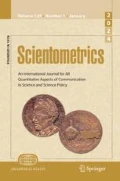Abstract
This paper seeks to examine the characteristics and quality of research planning at the level of microcosm of the research unit in six countries — Argentina, Egypt, India, Republic of Korea, Poland and USSR. It is concerned basically with the following aspects: (i) differences in the characteristics and quality of research planning in research units in different countries and institutional settings; (ii)pattern of relationships between the indices of planning and three measures of effectiveness—scientific, user-oriented and administrative; and (iii) stability in the pattern of relationships across countries and measures of performance. As a result of analysis, a few universal indices have been identified that have consistent relationships across countries. It is concluded that the determinants of effectiveness of research planning depend upon the criteria used for measuring the performance of the research unit. Besides specificity of research goals, the most important predictors of performance are: conceptual challenge of the research programme and external linkages of the research group—linkages with scientific peers and potential users of research results.
Similar content being viewed by others
References
A. RAHMAN,Social Goals and Planning of Science, Council of Scientific and Industrial Research, New Delhi, 1977.
R. G. KROHEN, Patterns of institutionalization of research, in: S. Z. NAGY, R. G. CROWIN (Eds),The Social Contexts of Research, Wiley-Interscience, New York, 1977.
J. D. BERNAI,Social Functions of Science, Routledge, London, 1939.
M. POLANYI, The republic of science: its political and economic theory,Minerva, 1 (1963) 54.
A. M. WEINBERG, Criteria for scientific choice,Minerva, 1(1963) 159.
D. SAHAL,Invention, Innovation and Economic Evaluation, Report No. 82-18, Graduate School of Business Administration, New York University, 1982.
H. BROOKS, Can science be planned? In: J. J. SALOMON (Ed.)Problems of Science Policy, OECD, Paris, 1968.
G. M. DOBROV, Panel discussion: Bernal versus Polayni, in: J. FARKAS (Ed.),Sociology of Science and Research, Akadémiai Kiadó, Budapest, 1979.
P. C. MAHALANOBIS, Science and national planning,Vijanan Karmee, 10(1958) 1.
S. H. ZAHEER, Organization and management of scientific research,Journal of Scientific and Industrial Research, (1965) 505.
A. RAHMAN, Research and national planning,Research and Industry, 1(1956) 241.
J. R. RAVETZ,Scientific Knowledge and its Social Problems Clarendon Press, Oxford, 1971.
R. JOHNSTON and T. JAGTENBERG, Goal direction of scientific research, in: J. FARKAS (Ed.),Sociology of Science and Research, Akadémiai Kiadó, Budapest, 1979.
R. TAGUIRE, Value orientations and relationship of managers and scientists,Administrative Science Quarterly, 10 (1965) 39.
P. E. CONNOR, Professionals in organizations: Some research suggestions,IEEE Transactions on Engineering Management, EM-31 (1984) 7.
W. E. SOUDER, Autonomy, gratification and R&D outputs: A small sample field study,Management Science, 20 (1974) 1147.
F. M. ANDREWS, The international study: its data sources and measurement procedures, in: F. M. ANDREWS (Ed.)Scientific Productivity: The Effectiveness of Research Groups in Six Countries, Cambridge University Press, 1979; S. P. GUPTA, International comparative study on the organization and performance of research units (ICSOPRU)—its objectives, methodology and major findings, in: P. S. NAGPAUL (Ed.),Organization and Efficiency of Research Groups, National Institute of Science, Technology and Development Studies, New Delhi, 1987.
P. HUNYA,A Ranking Procedure Based on Partially Ordered Sets, Kalmar Cybernetic Laboratory, Joseph Attila University, Szeged, 1976.
E. MANSFIELD, et al.,Research and Innovation in the Modern Corporation, W. W. Norton, New York, 1971.
K. P. NORRIS, The accuracy of project cost and duration in industrial research,R&D Management, 2(1971) 25.
R. J. MIGHT, W. A. FISCHER, The role of structural factors in determining project management success,IEEE Transactions on Engineering Management, EM-32, (1985) 71.
Author information
Authors and Affiliations
Additional information
This is a revised version of the paper presented at XIth World Congress of Sociology, New Delhi, India, August 18–22, 1986.
Rights and permissions
About this article
Cite this article
Nagpaul, P.S., Krishnaiah, V.S.R. Dimensions of research planning: Comparative study of research units in six countries. Scientometrics 14, 383–410 (1988). https://doi.org/10.1007/BF02017098
Received:
Issue Date:
DOI: https://doi.org/10.1007/BF02017098



